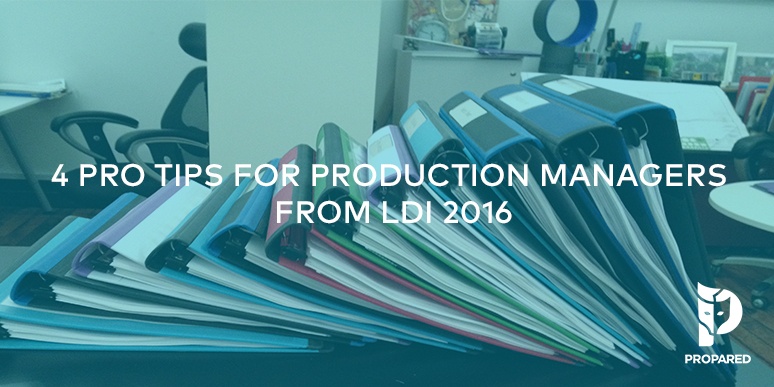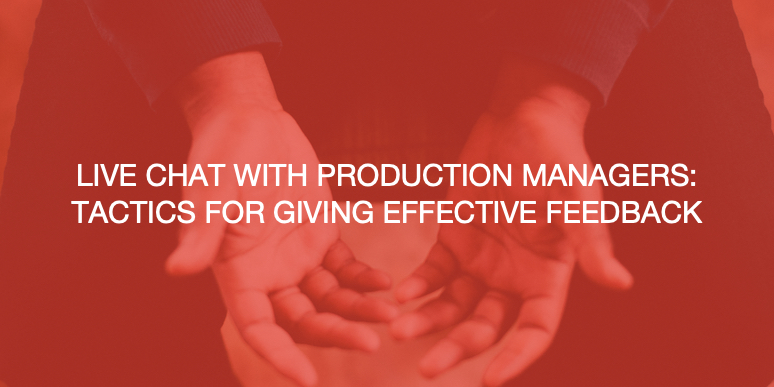
At the end of October, I attended LDI Conference in Las Vegas. I usually attend as a Production Manager with the intent of scoping out new gear and tech toys. This year, I also had the honor of being invited to join Mark Randel as a presenter in his 2-day class “Production Management 101”.
Mark’s goal for the class was to examine the critical components of the role of Production Management when managing events. We had an incredible audience full of experienced production managers and venue managers. With that much knowledge kicking around the room, what started as a “back-to-basics” presentation turned into a massive roundtable.
I had trouble keeping up with all of the amazing ideas floated over the two day intensive. But I managed to grab some of the most important ones and I’m excited to share 5 of them that will really boost your production management skills.
1. Preparation is at the heart of everything we do
Just about everything we do as production managers (any manager for that matter) ties back to proper planning. Given the short time periods we have to work with on site, every detail must be anticipated, visualized, and understood in advance. I mean, we even call it “advancing” in some parts of the industry. Detailed planning cannot be overlooked. If you only have 2 hours to load in, 1 loading dock, and 6 deliveries you’d better be sure your drivers know exactly when to arrive, in what order, and how much time they have to unload.
- Pro Tip: When providing delivery and loading dock schedules to your vendors, make sure to include who comes before and after them. This allows them to coordinate with each other to maximize their space and efficiency. No one likes a traffic jam.
2. Make sure you know what you need before your site visit
While planning begins with the very first phone call, it often starts in earnest during the site visit. Utilize these minutes in the space, however few, to answer as many questions as you can. It will save you a lot of planning time later. For example, forgetting to measure the width of the loading door might seem inconsequential at the time. But if your gear ends up being too big to fit, that little mistake can prove to be very costly.
- Pro Tip: Sit down beforehand and create a “Requirements” list. This is everything you’ll need or need to know to be able to do the job properly. Added bonus? Requirements lists are like templates. A lot of the early questions production managers ask are the same from event to event. Keep track of these lists and build on them over time. When the next gig comes, cross off the questions that don’t apply and head out (for example, if you’re doing an indoor gig you might cross off the questions dealing with tents and wind speed ratings).
Looking for a free Site Survey Template? Here is a sample you can use to get started!
3. Expectation-setting is often undervalued and overlooked
As human beings, we tend to see the world through one lens: our own! Expectation-setting is all about understanding the perspectives and needs of the people around us and providing them with the right information.
Part 1: Clients
When we set expectations and then exceed them, we look very good (yay more work!). When we don’t set expectations, the results are never as pretty (boo, maybe less work). Setting expectations ahead of time prepares your clients for the realities of the project and ensures they have a less stressful experience.
- Pro Tip: Write down what you need from your client to do your job and give it to them. You clients should know upfront exactly what type of information you’ll need to do the job successfully and what kind of turnaround times they should expect. Build it into your proposals and contracts. With well-documented expectation, disagreements are also easier to navigate. You have concrete evidence to which you can refer.
Part 2: Crew
Lets face it, your crew and staff work better when they know what’s going on. They’re able to make decisions on the fly that work TOWARDS your goals, not against them. It’s incredibly time-consuming to micro-manage your staff on site because they don’t know what to do next. Prepare them to work autonomously. Then you can focus on the unexpected problems that will inevitably arise.
- Pro Tip: Send out daily call sheets to the entire crew the day before they are coming to work. Include information like where to meet, goals for the day, team assignments, scheduled breaks, and important contact information. That way everyone comes to work with the right tools and knows what has to be done. This will also cut down on the time spent at the beginning of each call getting people up to speed.
4. Efficient workflow is paramount when working on a large scale
When you’re working on a large scale event or multiple events simultaneously, an efficient workflow goes from being optional to paramount.
Whether you’re taking notes at a site visit, building a schedule for your client, or booking your crew, your day-to-day workflow can keep you buried in computers instead of looking ahead to anticipate future challenges. This is a major challenge facing production managers, especially as our industry continues to grow and become more technologically complex.
- Pro Tip: Analyze your workflow. Before you can start to identify HOW to tackle large scale or large volumes of project, you have to understand your baseline. What are the most repetitive things you do each day? Where does most of the miscommunication happen? What are the most critical aspects of your workflow in delivering on your client’s vision?
Only when you completely understand your own world can you begin to look for appropriate fixes. Otherwise you’re just throwing stuff at the wall to see what sticks.
Mark covered many other topics in his 2-day class and I was honored to join him for such an informative presentation. If you missed it this year, keep an eye on next year’s seminar schedule. In a conference filled with techno-gadgets, it was nice to come together for a couple of hours and discuss some of the human elements of our industry.



